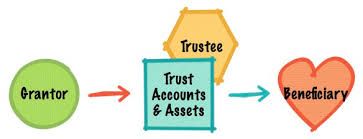What is a Trust?
- By Richard Young
- •
- 13 Feb, 2019
- •

A legal dictionary defines a trust something like this: an entity created to hold assets for the benefit of certain persons or entities with a trustee managing the trust. Most trusts are founded by the person(s) creating the trust, who sign a written declaration of trust which establishes the trust and spells out the terms and conditions upon which it will be conducted. The assets of the trust are usually given to the trust by the grantor, although others can add assets to it.
A trust can be compared to a Will, but is much more than that. Trusts are used during your lifetime, whereas a Will is not needed until after your death. Unlike a Will, the trust is never filed with a court and its contents are private. Usually you are the trustee and have the responsibility of administering and handling the assets in the trust. After creation of the trust, your assets are assigned, deeded, or transferred to the trust. The trust then owns the assets instead of you, but the assets are still for your use and benefit.
Why go to all this trouble? In the trust, you name a trusted person to be the successor trustee to manage the assets if you become disabled or incapacitated. The trustee is required use trust assets for your benefit, not theirs, and will be held accountable if they misuse the trust assets. Without a trust, the courts may decide who will handle your assets when you no longer have the ability yourself.
After the death of a married person, the assets in the trust are used for the surviving spouse until his/her passing. Lastly, after both pass away, the trustee can distribute the assets to beneficiaries as outlined in the trust without going through the probate process. This saves a lot of money for your heirs.
A trust is defined as an entity created to hold assets for the benefit of certain persons with a trustee managing the trust. The person(s) creating the trust signs a written trust agreement which establishes the trust and spells out the terms and conditions upon which it will be managed.
All this sounds nice. But what does it really mean and how will it help? The focus of this article is what should be in a trust. First, throughout our lifetimes we acquire “stuff,” such as a home and land and sometimes land in different states and countries. We own money in the form of cash, bank accounts, saving accounts, maybe investments such as certificates of deposits, money market accounts and other money investments. Also, we may own stocks, bonds, brokerage accounts, life insurance policies, annuities and other forms of money assets. We own personal property such as clothing, jewelry, vehicles, boats, motorcycles, motor homes, recreational equipment, jewelry, weapons and other tangible personal items.
These things are in our individual names and we can do as we choose with them, such as retain, sell, trade or mortgage them. Few limits are placed on our use of our possessions. Managing our “things” is easy while we are healthy. However, the problems occur when we lose our health or pass away. Who can access your property to help you, pay your expenses or distribute to your family on death? Usually the answer is no one without court intervention.
This is where the trust is beneficial. The ownership of many of these items is changed to the trust to be used for and by you while you are healthy and managed by a trustee for your benefit if you are incapacitated. After your death, assets are distributed your family or friends almost immediately. This saves the expense delay of probate and courts dictating who receives you property. A trust will protect you during your lifetime and later your family.

In America today, the nation and the people are enveloped in conflict among many diverse groups including conflicts among members of political parties, nationalities, socioeconomic classes, and, closer to home, families. On a personal note, many years ago I concluded that I am not effective in handling domestic relation cases between husbands and wives, not due to the difficulty of understanding the law, but because of the emotions of the parties involved. Emotions often hinder the ability to make rational decisions. I greatly admire those who practice this area of law, but also feel for them.
Conflict within families greatly increases upon the passing of a loved one. The big items, such as bank accounts, investment accounts, land, etc., usually are not difficult to distribute. The difficulty comes with dividing the decedent’s personal items among the beneficiaries. The things that mom or dad possessed and that the children grew up with have great sentimental value to the children. These items are often what families fight over. The old idea of a parent or even a child tagging personal items for specific people is not effective, and can lead to increased conflict.
Not all conflict can be resolved, but an effective tool in limiting conflict is a living trust which lists assets to be distributed as specifically as possible. A Personal Property Memorandum can be attached as an exhibit to a living trust. In this, the person specifies particular items to be distributed to particular people. Such a Memorandum may be changed or modified as situations change. The more specific the person is in detailing how items are to be distributed in their living trust, or even a will, the less likely a conflict will occur within the family.
Consideration should be given to reviewing your existing living trust or will to see how specific it is in distributing your property and whether any changes need to be made due to additions or losses of family members.

To reduce real estate taxes, Mississippi law allows all homeowners to file for Homestead Exemption on their primary home. The exemption is claimed by the homeowner filing an application in the office of the tax assessor in the county of residence. This is done between January 1 and April 1 of the year following the purchase of the property. Once homestead exemption is filed, any change of ownership must be reported to the tax assessor. Change of ownership may occur after death, divorce, inheritance or sale of the house. If a change of ownership has not occurred, there is no need to re-file each year.
If the house is deeded to a revocable or irrevocable living trust, will homestead exemption be lost? If the trust allows the home to be used as primary residence of the beneficiary of the trust, the exemption may be allowed. However, deeding the property to a trust is a change of ownership and a new application for homestead exemption must be filed with the office of the tax assessor in the first quarter of the following year. In filing the new application we suggest taking the deed conveying title into the trust along with a copy of the trust to the tax assessor’s office.
If the trust owns multiple homes, the homestead exemption can be filed on only one home, which should be the primary residence. If more than one home is lived in, only one can be claimed as the primary residence.
Should you have questions as to whether homestead exemption should be filed on a home deeded to your trust, we recommend contacting the attorney who prepared the trust to advise you. Two questions need to be answered: (1) Does the trust allow the lifetime beneficiary to use the home as a primary residence; and (2) Was title of the home transferred into the trust in the previous year?

A client recently came to our office with the following situation. The client’s mother had passed away owning a house in Mississippi plus a house, other land and mineral interests in another state. Though the woman was a native of Mississippi, most of her life was spent in the other state. She also left a Will leaving her estate to her husband and if husband predeceased, then to a daughter. The Will, however, was never signed and therefore is invalid.
Without a Will, her estate must be administered in the county where she lived at the time of her death. Her assets must be inventoried, creditors notified through publication in a newspaper and in letters to the creditors, and heirs at law must be determined by publishing a Notice to Unknown Heirs in the newspaper and then, at a hearing, the Court must rule who her heirs at law are. In this case, there is only one child. However, this does not end the problem. A similar administration must be filed in all other states where real property or mineral interests are owned. Although there are differences in each state’s laws, estate laws are somewhat similar and the same matters must be attended to according to the laws of the other state.
If the deceased had the foresight to create, fund and administer a Revocable Living Trust, the dual expense, months delay and long-distance administration would have been avoided. The Trust could be created in any state where the Grantor owned real property. The Trust would then be funded by transferring (deeding) the ownership of all real property and mineral interests to the Trust once and for all. The cost to administer estates in two states is at least four or five times the cost of creating a Trust and transferring property in each state.
Whether property is owned in just Mississippi, whether single
or multiple tracts, or in several states, a wise consideration is to create a
Revocable Living Trust and save your beneficiaries much delay, frustration, and
money.

When is the last time you looked at your Will or Trust? If it has been a while, you should read on.
Circumstances in life change: loved ones die, babies are born, people move away, some lose their ability to care for themselves, and financial or other assets change. Like our annual physical and regular automobile maintenance, our estate plans need to be reviewed periodically and possibly revised to adjust to the changed circumstances.
How many who have a Revocable Living Trust have even read it or reviewed its assets since the Trust was created? The Trust is a rather complex document and the provisions of it need to be understood. Elder Law attorneys suggest a Trust or Will be reviewed by a professional at least every three years, if not annually. This includes reviewing the provisions of the document, examining title to all assets in the Trust, inquiring as to the status of all trustees, agents and representatives, inquiring if any assets have been sold or new assets acquired and how any changes affect distribution to beneficiaries. For example, the Trust directs that Mama’s valuable family heirloom be distributed to her daughter, but Mama has given it to a niece prior to her death. Upon distribution of Trust assets, problems may occur. With periodic review, Mama could have removed the heirloom from distribution and saved hurt feelings.
From time to time people tell us they made a Trust several years ago and do not understand it and have not looked at it since. This should never occur. If you have an older trust and have not had it reviewed recently, you should. Contact the attorney who prepared it for you and set an appointment for review. After consultation, make any necessary changes. If the attorney is unavailable or has retired, contact another attorney who specializes in Trust work and set an appointment. A good thing about these documents is that they can be reviewed by any attorney who specializes in elder law.

In a trust, the Trustee is the person charged with the management, administration and handling of assets owned by the trust. The Trustee has a fiduciary duty, a special relationship, to the Grantor (Creator) of the trust to use the trust assets for the benefit of the Grantor during the Grantor’s lifetime, including any period of incapacity, and then to distribute the remaining assets to beneficiaries according to the terms set out in the trust agreement.
Trustee selection is important in creating a trust. Many times, the Grantor is the initial trustee who serves until incapacity or death and is succeeded by a named person. Successors are often children of the Grantor. The Trustee must be a person of honesty, integrity and who has the ability to handle business affairs. A common mistake by the Grantor in selecting Trustees is to name successor Trustees in the order of birth of children. This may be a costly mistake for the beneficiaries and for the Trustee. All people have different talents, abilities and gifts. A person without the gift of administration and business sense is not a good selection for Trustee. If children will be used as Trustees, serious consideration should be given to these qualities and the selection should be based on ability to serve rather than loyalty or age. The Grantor is doing a favor to the child who does not possess the ability to serve as Trustee by selecting another.
In discussing possible Trustees with your attorney, you should be honest and objective about the different strengths, abilities and weaknesses of the children and listen to the suggestions of the attorney as to who is the better choice for Trustee.
Duties of the Trustee include handling all assets in the trust, paying trust expenses and those of the Grantor, investing and regulating assets, including filing law suits if necessary to recover funds owed to the trust, ensuring that the trust assets benefit the Grantor first, and then, upon the death of Grantor, distributing the remaining assets to the named beneficiaries as set out in the trust.

In 1993, Congress passed laws setting a five year look-back period when transferring assets into an irrevocable trust to qualify for Medicaid benefits. It is not illegal to transfer assets to qualify for Medicaid benefits; however the transfer may delay the time of qualification if the transfer was made less than five years prior to the Medicaid application being filed. Transfers over five years are exempt under this rule.
When does the five year period begin to run for a transfer to a trust? In a Medicaid Asset Protection Trust (MAPT), the time begins running on the date of transfer of each asset into the trust. The date the trust is created is not when the five years begin to run. The transfer of assets normally begins soon after the date of the trust but the assets generally are transferred on different dates. For example, home and land are usually transferred to the trust by deeds within in a few days of date of the trust but financial and brokerage accounts, stocks, bonds, mutual funds, etc. and out of state land, may take several weeks to complete because each institution has their own forms which must be utilized for transfers. The five years begin to run on each asset when it is titled into the trust. Should an asset be transferred years later, a new five years begins to run the date it is transferred.
Will a transfer years later cause the five year look-back period to be extended retroactive on assets previously transferred? No, the five years runs for each asset when it is transferred into the trust. For example, a trust was created in 2015 and all then-owned assets are transferred within a couple of months, but then an additional $100,000, from an inheritance, is received in 2018 and transferred to the trust. The original assets will be protected in 2020, but the new transfer ($100,000) will not be protected until 2023.

About half of Americans turning 65 today will develop some condition requiring long-term services and support. These individuals will require assistance with activities of daily living such as feeding, getting dressed, or bathing. Often, nursing home care is needed to provide 24-hour medical care. The inability to gain access to affordable, competent care can be the most significant threat to the physical, emotional, and financial well-being of the afflicted individuals and their families.
The cost of institutional care can quickly impoverish working and middle-class individuals, costing on average $6,832 per month. For individuals who qualify, Medicaid will help cover those costs. The institutionalized individuals are required to pay all but a very small portion of their income each month for their care with Medicaid covering the rest. That can leave a spouse still living at home (the “Community Spouse”) without enough money to cover basic living expenses.
Congress recognizes the need for balance in the Medicaid program between providing long-term care based on medical necessity and preventing the impoverishment of the spouse at home. When determining Medicaid eligibility, all of a married couple’s assets are totaled regardless of who acquired it. To prevent complete impoverishment of the Community Spouse, Congress enacted some spousal protections:
• While the Institutionalized Spouse may have no more than $4,000 in assets in order to qualify for Medicaid, the Community Spouse may retain some assets. In 2019, the combined value of assets of the Institutionalized Spouse and the Community Spouse allowed is $126,420.
• If the Community Spouse’s income is below $3,160.50 per month, then some or all of the Institutionalized Spouse’s income can be given to the Community Spouse to bring the Community Spouse’s monthly income up to $3,160.50.
• Medicaid does not count the Community Spouse’s income when determining whether the Institutionalized Spouse is eligible for Medicaid. The Institutionalized Spouse’s income is limited to $2,313 per month.
Many do not realize that the spouse at home can have some assets and also possibly access to the Institutionalized Spouse’s income to help pay the bills.

Accessing a safe deposit after the death of the person leasing the box (the “lessee”) if an estate is opened is a relatively easy process. However, if an estate is not opened, or has already been closed before discovering the existence of a box, gaining access to it can be an aggravating ordeal. Until now, the time and expense of opening an estate in the court system has been required to get authority to open a safe deposit box, which box may or may not contain items of value. For example, several years after closing an estate, the family found that the deceased leased a safe deposit box. The estate had to be re-opened so that the Court could order the bank allow access to the box. We opened it and found nothing but an old canceled promissory note. The family had to pay the cost to re-open the estate and there was nothing there, but we had no other way of knowing what was kept in the box.
Effective July 1, 2018, the Mississippi Legislature has passed new legislation allowing easier access to safe deposit boxes when an estate is not opened. The law provides that a financial institution must grant access to a safe deposit box to certain persons after six months have elapsed since the death of the lessee. The person seeking access when no estate has been opened must be either: (1) the personal representative (executor) named in the lessee’s will; or (2) a successor (heir) of the deceased lessee who died without a will. Additionally, the following documentation must be provided: (1) proof of lessee’s death; (2) proof of the identity of the person seeking access; and (3) a sworn affidavit containing the name of the lessee and date of death, the county where the lessee lived at the time of death, and a statement that no petition for appointment of a personal representative has been granted or is pending in any jurisdiction.
It is a good idea to add a co-owner to your safe deposit box so that someone will have access to its contents upon your death.

A misconception about Revocable Living Trusts is that once assets are transferred to the trust, they are untouchable or hard to get to which could cause you to be unable to access them when needed. This simply is not accurate. There is very little change in how you use your assets. You are able to control and manage assets during your lifetime and choose who will manage your affairs when you cannot and the conditions under which they will be managed upon your incapacity or death.
As the trustee of a revocable trust, you control everything about the trust and use the assets you choose, when you choose and how you choose. You are not under any restrictions in their use.
If you become incapacitated and are no longer able to handle your affairs, the assets must be used for your care and that of your spouse, if married, and not for anyone else. When you create a trust, you choose who will take over as trustee if you can no longer serve. This person – often a spouse, adult child or close friend – uses the assets for your benefit during your lifetime. This could save family members from going to court to create a conservatorship to gain access to your funds. Conservatorships are expensive, cumbersome and require public disclosure of assets.
Similar to a Will, you choose who receives your assets and in what proportion and when they will receive it upon your death. Unlike a Will, no probate is required to distribute trust assets. Trusts also give more flexibility than a Will in how distributions are made. Assets can be distributed immediately following death or can be spread out over a longer period of time, if needed, to protect any beneficiaries who lack the capacity of handling their affairs or are minors or have any special needs.


